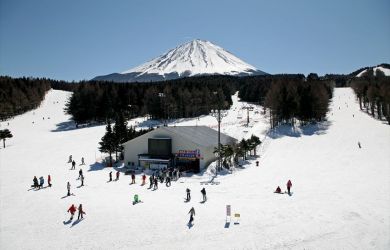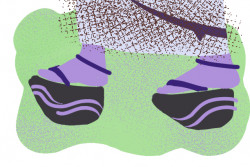
March 26, 2009
On the Road to Justice
A motorcyclist sets out to keep his family's killer behind bars
By Metropolis
Originally published on metropolis.co.jp on March 2009

Photo & illustration by Kohji Shiiki
The events of May 27, 2005, are likely to haunt Alberto Stucki forever.
“It was the night before we were going to move to Chiba, and we were very tired because we’d been packing all day,” says Stucki, a 53-year-old Swiss-Italian who has lived in Japan for 33 years. “I went to bed first, at about 11:30pm, and my daughter came about 10 minutes later to say goodnight. Then I woke to hear my wife shouting ‘Alberto, fire!’ It was too late… The only thing I could do was jump out of the window. I still don’t know if I could’ve done something. That makes me sick every night. I have the worst nightmares every day.”
The blaze at Stucki’s home in Miyazaki claimed the lives of his wife, Kimiko, 46, and his younger daughter, Yurie, 12 (pictured). It wasn’t until later that he learned this tragedy was no accident. The fire was set by a 37-year-old serial arsonist named Yuji Takeyama, who, according to Stucki, had been in custody eight times previously and went on to attempt three similar crimes. Even after his arrest, the killer showed no remorse.
“The son of a bitch just stood and watched my house burn down,” Stucki says. “He was there, watching in the crowd. I got a letter [from Takeyama]. He said he planned one month previously to steal from my house. He didn’t care if we died when he started the fire. It was his plan.”

Courtesy of Alberto Stuck
Takeyama was sentenced to life imprisonment in June 2005. But in Japan, life doesn’t necessarily mean life. With the killer up for possible future release, Stucki has spent the past four years touring the country with a simple goal: the introduction of a prison sentence of life without parole.
Article 28 of the Japanese Penal Code states that prisoners sentenced to life imprisonment (muki choeki) may be paroled after 10 years on the condition that they “evince signs of substantial reformation.” According to justice ministry figures, the 74 life-term convicts paroled from 1997-2007 served an average of 23.5 years behind bars. Although Japan has no law allowing judges to sentence criminals to life without parole (shushin-kei), they do have the option of sending convicts to the gallows—a punishment Stucki saw fit for Takeyama.
“People who are against the death penalty have not experienced a family member being killed. If a member of Amnesty International had a family member murdered in front of their eyes, they would change their mind,” Stucki tells Metropolis during an interview at a Tokyo hotel. “There is no doubt I agree the death sentence is inhumane. It’s absolutely not human. But on the other hand, when these people kill, they are also not human…What about those little kids who are killed for pleasure, sexual pleasure. What is their future? What is my daughter’s future?”
The prosecutors demanded life for Takeyama, but Stucki says he had no sway over the prosecution’s demands, and he deplores the fact he couldn’t take the case to a higher court.
“Who was the drunk person who made this law? Why do families have no right to appeal? If you can’t kill him, don’t ever let him out.”
Two weeks after Takeyama’s sentence was handed down, Stucki hopped on his Honda XL 1000 Varadero and began his campaign. He has since met with politicians, activists, victims and members of the public in all 47 prefectures. In 2007, on his third tour, he submitted a petition with about 80,000 signatures to former Justice Minister Kunio Hatoyama, a man the Asahi Shimbun dubbed the “Grim Reaper” for signing 13 execution warrants in just over a year in the role.
Now on his fourth crusade in as many years, Stucki has covered 180,000km and amassed 95,000 signatures. His travels, however, have come at great financial cost—he has spent his entire life savings of ¥22 million.
While Stucki selected his mode of transport for practical purposes—expressway tolls are cheaper, and the bike is handy for skipping round slow-moving traffic—he has a more personal reason for touring around on what he describes as his “most important partner.”
“When I ride on my motorcycle, I feel Yurie is together with me. From when she was 3 or 4 until she was about 12, we traveled from Miyazaki to Kansai every year on summer vacation. It was a special time. I did the same with my elder daughter,” he says, referring to Miyuki, who was in Tokyo on the night of the blaze.
Of the 280 lawmakers Stucki has met, more than 100 have signed the petition, but others have paid mere lip service to his cause.
“Yesterday, I spoke for more than two hours with members of the justice ministry. I asked difficult questions that they couldn’t answer. I asked why the Japanese government, even if a criminal commits a very terrible crime, tries to protect him by reducing his sentence. I also don’t understand people being released for good behavior. They tell me, ‘I understand your feelings, but it’ll be difficult to achieve.’ They’re like snakes—in Italian, we say, Vaffanculo.”







